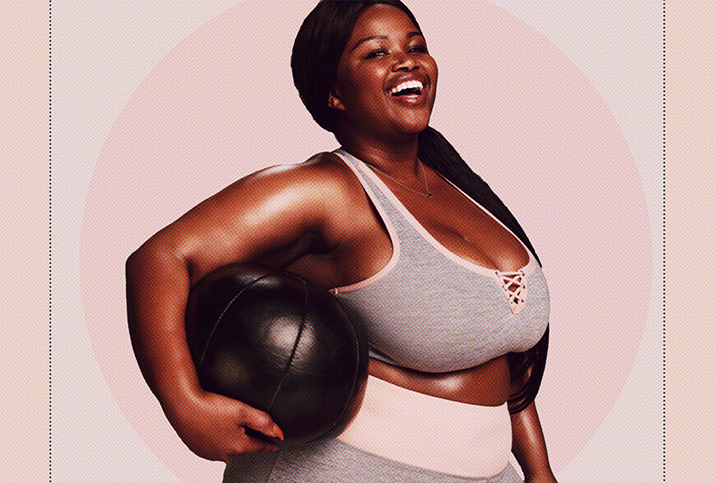What Is a FUPA?

The phrasing has been around since at least the 2010s, and the actuality has been around since, you know, the beginning of women. The term went viral in 2018 when singer Beyoncé proudly told Vogue magazine that she had a FUPA and she was OK with it.
So, what does FUPA stand for? FUPA quite literally stands for fat upper pubic area, all a FUPA really refers to is "the fatty tissue on top of the pubic bone, called the 'mons,'" according to Alyssa Dweck, M.D., an OB-GYN in Mount Kisco, New York, a spokesperson for feminine care brand Intimina, and the author of "The Complete A to Z for your V."
Why do some women have a FUPA? It depends, but genetics, weight gain and pregnancy are all common factors.
"The mons area is an area where fat can accumulate with age and after giving birth," explained Michelle Koo, M.D., founder and CEO of Dr. Koo Private Practice in Aspen, Colorado. "The FUPA becomes fuller with age and after multiple pregnancies, and especially after C-section scars that cut off its venous return."
While many women of all sizes have excess fat in their pubic areas, some may worry that their FUPA could negatively impact their reproductive health.
Is having FUPA good?
Starting with the good news, a little extra cushion can actually be beneficial.
"This fatty tissue is soft and may play a role in protecting the pubic bone from mechanical pressure, damage or pain, even during intercourse," Dweck said.
Beyond its protective qualities, your mons also plays a role in sexual attraction.
"The mons contains glands which secrete pheromones, natural chemicals unique to individuals, which plays a role in sexual attraction," she explained.
If you choose to keep your mons nice and warm with pubic hair, you might get double the benefit.
"Since the mons is hair-bearing, for those who maintain hair, pheromones can be trapped in this hair to aid in mate attraction," Dweck added.
FUPA and your reproductive health
While your FUPA has nothing to do with how your menstrual cycle functions, it may be on the receiving end of menstrual pain.
"Some [people] may experience vulvar pain as a premenstrual- or menstrual-related symptom; the mons may be included in this generalized discomfort," Dweck explained. "Oftentimes, skin glands become more active during the premenstrual and menstrual times. This would apply to the mons skin, which is naturally hair-bearing and subject to hormonal fluctuations."
Excess pubic fat itself doesn't have much to do with your fertility, but extra weight overall can make getting pregnant more difficult. Obesity in women can cause a longer conception time, decreased fertility rates and higher rates of miscarriage compared to women in a healthy weight range, according to a 2020 review of 68 studies published in the International Journal of Endocrinology and Metabolism.
Of course, it's important to remember that not every woman with a FUPA is in an unhealthy weight range. Always talk to your doctor about your specific risk factors when trying to conceive.
Getting rid of your FUPA (if you want)
We all have body-image triggers, things we don't love about ourselves that we'd change if we could. If your FUPA makes you uncomfortable and you want to get rid of it, you have options.
Weight loss
You could try shedding weight to potentially decrease the size of your FUPA. Overall weight loss has major benefits.
"It is preferred [to] frame weight management within a framework of optimizing health and wellness," Dweck said. "Ideal body weight improves cardiovascular health, immunity, fertility and lowers risk for diabetes, many cancers and poor self-esteem."
It is important, however, to remember that you can't target your weight loss. If you're aiming to lose your FUPA, general weight loss rules apply.
"General caloric restriction and toning might affect the mons similarly to any other area of the body with fatty tissue," Dweck advised.
Monsplasty
If weight loss isn't an option for you, there are surgical options such as monsplasty, sometimes called a pubic lift.
"A monsplasty is a cosmetic surgery that aims to remove both extra skin as well as fatty tissue from the mons pubis," said Alexis Parcells, M.D., a board-certified plastic surgeon and founder of Sunnie Skincare in Shrewsbury, New Jersey. "The goal of a monsplasty is to lift, tighten and reshape this area."
"If there is only fat in the mons, liposuction alone will reduce the bulk of the mons. If there is a significant amount of skin, the skin must also be removed," Koo explained.
"Monsplasty doesn't come without its risks, including infection, bleeding, wound healing delays, numbness, skin discoloration, contour irregularities or asymmetries and unfavorable scarring," Parcells said. "This is why it is so important to see a board-certified plastic surgeon who has experience in these procedures."
Postsurgical weight gain could cause the mons to grow again, although Koo noted this would likely have to be "a significant amount of weight gain of 30-plus pounds."
"Weight fluctuations and additional pregnancies may increase the risk of recurrence, although this is pretty rare," Parcells added. "Most patients are very happy with their results and report an improved comfort with hygiene, having sex and an overall confidence boost."
Surgery may be right for you, or it may not. Dweck advised women not to take the decision lightly.
"These decisions are significant and need to be made thoughtfully and for the right reasons," she added.
Loving yourself, FUPA and all
Whether you own your FUPA like Beyoncé or yearn to be rid of it, making peace with your body wherever you're at is always a good step. We can't always control the way our bodies look, and for some women, their FUPAs are proof of motherhood, of a life well lived.
Whatever you decide to do—or not do—with your body is your choice. But if you do want to get rid of your FUPA, talk to your doctor to get their advice about your specific situation.
If you're looking for a new doctor—you've moved, your longtime physician retired, you just need a change—Giddy Telehealth takes the difficulty out of the search. The easy-to-use online service provides access to hundreds of healthcare professionals who have expertise across the full scope of medical care. Many of them specialize in women's health and offer same-day video visits.


















